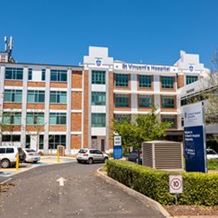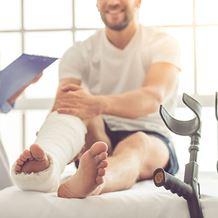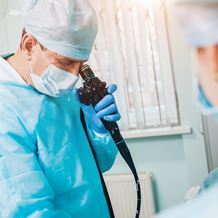Patient resources Weight-loss Surgery

- Home
- Our Hospitals
- St Vincent’s Private Hospital Toowoomba, QLD
- Patient Information
- Weight-loss surgery
Important information for all patients
Please read prior to admission
PDF file for download/print
After your procedure
After you have had your weight-loss/bariatric surgical procedure there are a few things the nurses will be attending to for you.
- After your surgery you will be allowed to have ice and small sips of water. Allow the ice to melt in your mouth and avoid swallowing solid pieces of ice. Your surgeon will upgrade you to sips of clear fluids as tolerated.
- Your nurse will be checking your observations, wounds and pain scores.
- Your nurse will be giving you medications through your drip to assist with prevention and management of nausea and pain. Please speak with your nurse if you require additional pain or nausea medication.
- Your nurse will also give you a cold pack for your abdomen, this can be a very soothing form of pain relief.
- With help from your nurse, you can get out of bed when you first need to go to the toilet.
- You will have sequential compression device (SCD’s) and TED stockings on your legs which help prevent blood clots. You will need your nurse to remove the SCD’s so you can get up to go to the toilet.
- After laparoscopic surgery you may experience shoulder-tip pain. Your nurse has various simple techniques that may help. These include a hot pack to your shoulder, standing or sitting upright, walking and simple pain relief. Please let your nurse know if you are experiencing any shoulder-tip pain.
The morning after your surgery
The morning after your surgery you will be seen by your surgeon. If you are progressing well you will be allowed to have the bariatric free fluid diet. Your nurse will take off your SCD’s, take down your drip and bung the cannula. Your cannula remains in place until your discharge just in case you require further medications this way. Once your surgeon has seen you, all your medications are given to you orally. Remember to take medications one at a time.
Your nurse will continue to check your observations and change your dressings.
Your nurse will monitor your pain and nausea and give you pain relief or anti-nausea medications as required. You may continue to use cold packs for your abdomen and hot packs for your shoulders.
Your nurse will remove your compression stockings prior to your shower and will reapply them after. These are designed to prevent blood clots.
You are encouraged to go for walks every 2 hours along the corridor and continue some deep breathing exercises.
You will be seen by the Bariatric Nurse who will discuss with you the things you need to consider when you go home.
Fluid intake in hospital
While you are in the hospital the aim is that you are able to tolerate fluids without causing pain or nausea.
As soon as you are able to order from the bariatric free fluid diet it is very important to order some cordial or juice to put in your water. You may remember your dietitian has explained to you that water has a high surface tension and will sit heavy and be uncomfortable in your stomach. A few drops of cordial or juice will break the surface tension, making water more tolerable.
To help with hydration sip small amounts of fluid every 15 minutes, stop if you feel full or nauseated.
Drinking too much too often may be uncomfortable and may make you feel nauseated. Slow down.
Do not use a straw.
Going home
Your surgeon will discharge you from hospital when you are drinking fluids, your nausea and pain has settled, and you are recovered enough after the anaesthetic. If you require a medical certificate, please ask your surgeon for one on the day of discharge or contact their rooms for one to be issued to you.
Contact your surgeon’s rooms IF YOU EXPERIENCE ANY OF THE FOLLOWING:
• You are unable to tolerate free fluids or experience ongoing nausea or vomiting.
• You have increased pain, fever, chest pain, shortness of breath or pain in the calf of
your legs.
• You have increased pain, swelling, heat or offensive ooze from your wound sites or
cannula site.
Driving:
You must not drive yourself home. It is recommended that you do not drive for 7 days.
Motor vehicle insurance companies have differing policies around driving after an anaesthetic. It may be advisable to contact your motor vehicle insurance company.
Stockings:
You may take your stockings off after you get home. However, you should put them on if travelling in a car for more than 30 minutes in the first week.
Wounds:
Your wounds have dissolvable sutures, steri-strips and waterproof dressings. You may shower as normal and gently pat your wounds dry. The waterproof dressing should be taken off 4 days after discharge from hospital leaving the steri-strips in place. The steri-strips will fall off over the next two weeks. Continue to shower as normal and gently pat your wounds dry.
If at any time your wounds look red, shiny, hot, swollen or tender, contact your surgeon or GP to have your wounds reviewed.
Walking:
It is recommended that you go for short walks every 2 hours. Gentle exercise after surgery is an important part of your recovery.
Lifting:
It is recommended that you avoid heavy lifting for the first four weeks after your surgery.
Oral medications and pain relief:
All of your usual medication should be taken without difficulty, but may need to be taken one at a time with a few sips of fluid in between.
Please do not stop any of your medications unless advised by a doctor.
If medications have been stopped or altered prior to your surgery please discuss with
your surgeon what to do with those particular medications.
You will be prescribed an anti-reflux medication after your surgery and this must continue after discharge. Sleeve Gastrectomy - 1 month, Gastric Bypass - 3 months.
You will be prescribed an anti-nausea medication to take home to manage any nausea you may experience.
Use hot packs for shoulder-tip pain and cold packs for your abdomen if you’re uncomfortable.
When you go home paracetamol is usually adequate for pain relief. Panadol minicaps are usually tolerated well. Take as per packet instructions, remember take one tablet at a time.
*Remember*
Do not take any Non-Steroidal Anti-Inflammatory drugs (NSAIDs). One of the most common NSAIDs is Ibuprofen, also known as Nurofen or Advil. Other common NSAIDs such as Voltaren or Celebrex should also be avoided. The list of NSAIDs is extensive, if you are unsure please check with your prescribing doctor. Always check with your pharmacist when purchasing over-the-counter drugs.
Protein:
Your protein supplement should be started once you get home. Your dietitian will have given you a daily total that you must consume.
Multivitamins:
When you go home start your bariatric multivitamin as discussed with your dietitian.
Fluid intake at home
Once you go home you will need to follow the fluid diet outlined by your dietitian for the next two weeks. Start your protein and vitamins as you have been directed.
Work towards 100-200 mls of fluid an hour and about 1500 mls a day.
Sip small amounts of fluid every 15 minutes, stop if you feel full or nauseated. Remember to add a few drops of cordial or juice to break the surface tension of the water.
Keep an idea of how much fluid you are getting each day. It may help to write it down until you get into a routine.
Do not use a straw.
Please contact your surgeon if you are unable to tolerate at least 1 litre of fluid per day.
Support
Remember, you have a team of medical professionals who are here to help and support you along the way. Please contact any of them if you are needing help or support. Their care is ongoing.
The St Vincent's Private Hospital Bariatric Clinical Nurse will ring you a week after you leave hospital.
Follow up appointments
You will require follow-up appointments over the next 12 months.
These appointments are a part of your support structure and are extremely important for your ongoing health and long term success from your surgery.
Dietitian:
The dietitian plays a very important role in your successful long-term outcome following your weight loss surgery. They will assist you to navigate through your new way of eating to ensure that you achieve optimal nutritional intake.
You will see the dietitian post-surgery at 2 weeks, 4 weeks, 6 weeks, then 3 months, 6 months, 9 months and 12 months. Thereafter you are encouraged to maintain annual reviews to help you stay accountable to your new way of eating and to ensure nutritional health.
You may also see the dietitian at any time you feel you need to. Just phone for an appointment.
You will see your surgeon 1 month after your surgery then at 3 months, 6 months and 12 months. You will have yearly reviews after that to review your blood tests and check your general progress.
Blood tests:
Routine blood tests are required after bariatric surgery. Blood tests post-surgery are done at 6 months, 12 months and yearly thereafter.
Related Content

Patient Information & Safety- Admission Information
Information about patient admission at St Vincent's Private Hospital Toowoomba.
Read More
Orthopaedics
Information for patients having orthopaedic surgery at St Vincent's Toowoomba.
Read More
Bowel, Colorectal & Upper Endoscopy
Information for patients having bowel and colorectal procedures at St Vincent's Toowoomba.
Read More
